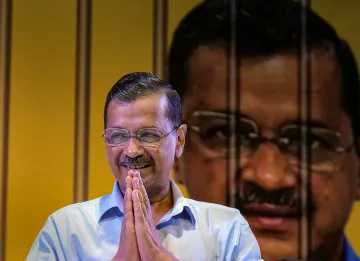Arvind Kejriwal bail: The Supreme Court on Friday granted bail to Delhi Chief Minister and Aam Aadmi Party (AAP) leader Arvind Kejriwal on bail bond of Rs 10 lakh and two sureties in the Delhi excise policy case. The apex court, however, directed the CM not to make any public comment on the merits of the case. The court on Kejriwal's bail plea said, "No impediment in arresting a person who is already in custody in another case for purposes of a probe."
read PDF here
The matter relates to alleged corruption in the formulation and execution of the Delhi government's excise policy for 2021-22, which has now been scrapped. The Enforcement Directorate (ED) has also lodged a separate money laundering case linked to the alleged excise policy 'scam'. According to the CBI and the ED, irregularities were committed while modifying the excise policy and undue favours extended to licence holders. On July 12, the apex court had granted interim bail to Kejriwal in the money laundering case.
While delivering the verdict, Justice Ujjal Bhuyan said CBI arrest was only a measure to make meaningless bail in the ED case and added that the CBI must dispel the notion of being a caged parrot and expressed reservations against bail condition in the ED case barring Kejriwal from visiting CM Secretariat or signing files.
'Satyamev Jayate'
The AAP hailed the Supreme Court decision granting bail to Delhi Chief Minister Arvind Kejriwal in the corruption case linked to the excise policy 'scam' as "victory of truth". In a post on X, the AAP said, "Satyamev Jayate."
'Congratulations to AAP family'
Delhi Chief Minister Arvind Kejriwal's wife Sunita congratulated the AAP on the Supreme Court's decision to grant bail to her husband and wished for the release of other leaders lodged in Tihar jail. "Congratulations to AAP family! Kudos for staying strong. Wishing also the soonest release of our other leaders," Sunita said in a post on X.
The high court had noted that the loop of evidence against Kejriwal got closed after collection of relevant evidence following his arrest by the CBI and it cannot be said that it was without any justifiable reason or illegal. The high court had also granted him liberty to approach a trial court with his plea seeking bail in the case.
The top court had referred to a larger bench, preferably of five judges, for in-depth consideration of three questions on the aspect of "need and necessity of arrest" under the Prevention of Money Laundering Act (PMLA). The ED had on March 21 arrested Kejriwal in connection with the money laundering case.
During the arguments on September 5 on Kejriwal’s plea in the corruption case, the chief minister had vehemently opposed in the apex court the CBI's contentions that he should have approached the trial court first for bail in the corruption case. Questioning the maintainability of Kejriwal's pleas, Additional Solicitor General S V Raju, appearing for the CBI, had submitted that even in the money laundering case in which he had challenged his arrest by the ED, he was sent back by the apex court to the trial court.
Latest India News
